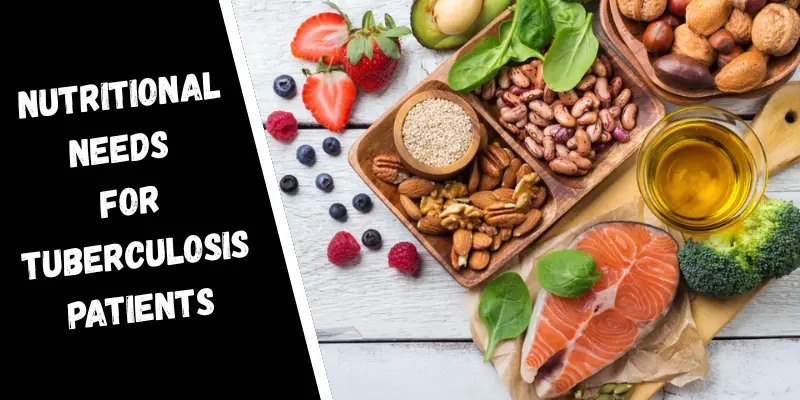Tuberculosis Nutrition: Tuberculosis is a sickness that makes people feel very weak and tired. It can make it hard to eat, and when we dont eat well, our body can not fight the illness properly. Eating the right food gives the body strength to get better. This guide will help you learn which foods are good for people with TB and how a healthy diet can help them feel stronger every day.
What is Tuberculosis Nutrition?
Tuberculosis nutrition means eating the right kinds of food to help the body fight TB. When someone has tuberculosis, their body needs extra energy, protein, and vitamins to stay strong. Good nutrition helps the body heal faster, fight infection better, and feel less tired. Its like giving fuel to a car without the right fuel, the car would not run well, and without healthy food, the body would not recover quickly.
How TB and Nutrition Affect Each Other
Tuberculosis Nutrition are closely linked when one gets worse, the other does too. Understanding this connection helps in faster recovery.
- TB makes people lose weight
- When someone has TB, they may stop eating well and lose weight quickly.
- TB reduces appetite
- Many people with TB do not feel hungry, so they eat less than they should.
- Less food means less strength
- When a person eats less, the body becomes weak and can not fight the sickness well.
- Poor nutrition weakens the immune system
- Without enough vitamins, proteins, and minerals, the body can not protect itself from germs.
- Weak body = slower healing
- People who don not eat properly take longer to feel better from TB.
- Good food helps the body fight TB
- Eating healthy food gives energy and helps the body recover faster.
- It is a cycle: TB affects food, and food affects TB
- TB makes it hard to eat, and not eating well makes TB worse.
Nutritional Needs for Tuberculosis Patients

Tuberculosis Nutrition patients are very important to help the body fight the infection and recover faster. Proper food provides the energy, vitamins, and proteins needed to stay strong and healthy during treatment.
- Increased Energy
- TB patients need more energy than usual to help their bodies fight the illness. They may need 20–30% more calories to stay strong and healthy.
- Protein for Healing
- Protein helps repair and rebuild body tissues. TB patients need extra protein to help their body recover faster and stay strong.
- Vitamins and Minerals
- Vitamins like Vitamin C and Vitamin D are important for boosting the immune system. Minerals like zinc and iron help in faster recovery and prevent weakness.
- Healthy Fats
- Healthy fats, such as those from nuts and seeds, give the body long lasting energy. They also help absorb important vitamins.
- Fiber for Digestion
- Fiber-rich foods like fruits, vegetables, and whole grains keep the digestive system healthy, which is important for overall well-being.
- Hydration
- Drinking enough water and other fluids helps the body stay hydrated and supports the organs in functioning well, especially during illness.
Common Nutritional Deficiencies in TB Patients
TB patients often face nutritional deficiencies that can make recovery harder. These deficiencies can weaken the immune system and slow down healing.
- Vitamin D Deficiency
- People with TB often have low levels of Vitamin D, which helps the body fight infections and stay strong.
- Iron Deficiency
- TB can cause anemia, which happens when the body doesn’t have enough iron. This can make you feel tired and weak.
- Vitamin B12 Deficiency
- Lack of Vitamin B12 can affect the blood cells and nerves, making a person feel very tired and weak.
- Zinc Deficiency
- Zinc is important for healing and fighting infections. TB patients may lack zinc, which slows down recovery.
- Protein Deficiency
- Protein helps the body repair itself. TB patients may not get enough protein, which affects healing and strength.
Dietary Recommendations for Tuberculosis Patients

A healthy diet is crucial for people with tuberculosis, as it helps strengthen the body and speed up recovery. Below are some important dietary recommendations to support TB patients in their healing process.
- Eat a Balanced Diet
- Include a variety of foods like fruits, vegetables, whole grains, and lean proteins to give your body the nutrients it needs to fight TB.
- Increase Protein Intake
- Foods like eggs, beans, chicken, and fish help rebuild tissues and strengthen the immune system.
- Stay Hydrated
- Drink plenty of water, soups, and natural juices to keep your body hydrated and help in recovery.
- Small, Frequent Meals
- If you don’t feel like eating much, try eating smaller meals throughout the day to ensure your body gets enough energy.
- Eat Foods Rich in Vitamins and Minerals
- Include foods like spinach, carrots, and citrus fruits that are packed with vitamins to support your immune system.
- Avoid Processed Foods
- Try to stay away from junk food and foods high in sugar. They can weaken your immune system and slow down recovery.
- Consult a Doctor for Supplements
- If you have trouble getting enough nutrients from food, your doctor may recommend taking vitamins or supplements.
Role of Nutritional Supplements
Nutritional supplements can play an important role in helping people with tuberculosis, especially when it’s hard to get all the nutrients from food alone. Sometimes, TB patients may have trouble eating enough or absorbing nutrients, so supplements can fill in the gaps.
They can provide extra vitamins, minerals, and protein needed to boost the immune system and improve overall health. However, it’s important to consult a healthcare provider before taking any supplements, as the right type and amount depend on the person’s specific needs.
Challenges in Maintaining Proper Nutrition
Maintaining proper nutrition can be difficult for people with tuberculosis due to several challenges. One major problem is loss of appetite, which makes it hard for patients to eat enough. TB can also cause nausea or stomach issues due to medication, further reducing the desire to eat.
In some cases, people may not have access to healthy or affordable food, especially in areas where nutritious options are limited. These challenges can make it harder for patients to get the vitamins, minerals, and energy their body needs to fight the disease and recover.
Strategies to Overcome Nutritional Challenges
When someone has tuberculosis, it can be hard to eat the right foods. However, there are simple strategies to make sure they get the nutrition they need to fight the illness and feel stronger.
- Meal Planning
- Preparing meals in advance can help ensure that a person with TB always has access to healthy food, even when they don’t feel like cooking or eating.
- Small, Frequent Meals
- Instead of eating three large meals, try eating smaller meals throughout the day to help with appetite and make eating easier.
- Add Nutrient-Rich Foods
- Include foods high in protein, vitamins, and minerals, such as eggs, lean meats, fruits, vegetables, and whole grains, to help the body stay strong.
- Hydration
- Drink plenty of fluids like water, soups, and smoothies to stay hydrated and support the body’s recovery process.
- Seek Support from Health Workers
- Getting advice from doctors, dietitians, or community health programs can help find the right foods and supplements to improve nutrition.
- Community Resources
- In many areas, there are local organizations or food programs that provide free or affordable nutritious meals for people with TB.
- Try Easy-to-Eat Options
- If appetite is low, try soft foods like yogurt, mashed potatoes, or smoothies that are easy to eat and still provide nutrients.
Common FAQs About Tuberculosis Nutrition
Here is some common faqs about Tuberculosis Nutrition:
1. What should a person with TB eat?
A person with TB should eat a balanced diet rich in fruits, vegetables, whole grains, and lean proteins to help their body fight the infection.
2. Why is nutrition important for TB patients?
Good nutrition helps the body stay strong, fight infection, and recover faster from Tuberculosis Nutrition.
3. Can TB cause weight loss?
Yes, TB can cause weight loss due to loss of appetite and the body using more energy to fight the infection.
4. What foods help boost the immune system in TB patients?
Foods like citrus fruits (rich in vitamin C), eggs, nuts, seeds, and lean meats can help strengthen the immune system.
5. How much protein do TB patients need?
TB patients need more protein to help repair tissues and support the immune system, about 1.5 to 2 times the normal amount.
6. Should TB patients take supplements?
Sometimes TB patients need supplements, especially for vitamins like vitamin D, B12, or iron, but this should be done under a doctor’s advice.
7. Can drinking water help TB patients?
Yes, staying hydrated is very important as it helps the body function properly and supports recovery.
8. What if a TB patient has no appetite?
If a TB patient loses their appetite, they should try eating smaller, more frequent meals, and nutrient-rich snacks throughout the day.
9. Is it okay to eat spicy food during TB treatment?
Spicy food may cause discomfort or upset the stomach, so it’s best to avoid it if it makes the patient feel worse.
10. Can a healthy diet cure TB?
No, a healthy diet cannot cure TB, but it can help strengthen the body and make the treatment more effective.
Conclusion
Proper nutrition plays a crucial role in helping people with Tuberculosis Nutrition recover faster and stay strong. Eating a balanced diet rich in essential nutrients supports the immune system, fights infection, and reduces the side effects of TB treatment.
By focusing on healthy food choices and overcoming nutritional challenges, TB patients can improve their overall well being and feel better during their recovery journey.
